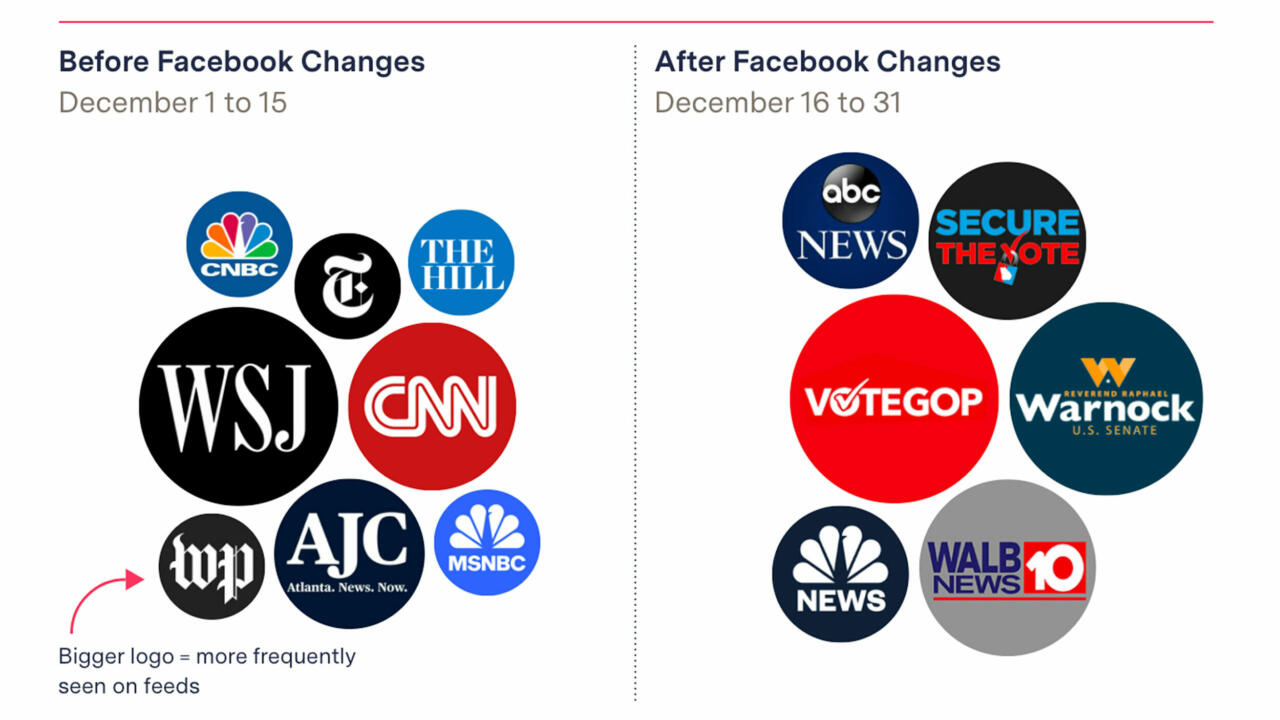Greetings!
Happy New Year. And thank you so much for signing up to receive updates about The Markup’s Citizen Browser project and for your patience as we have worked to get this ambitious project off the ground.
As you probably know, since you signed up for this pop-up newsletter, Citizen Browser is a first-of-its-kind project that aims to look inside the black box of social media algorithms by building a nationwide representative panel of users who share data with us.
After months of developing software and recruiting panelists, we’re launching Citizen Browser today! We were happy to get up and running in time to take a peek into what’s been happening on people’s Facebook feeds in Georgia, amid today’s runoffs, the most consequential Senate elections in memory.
There’s a reason this sort of insight hasn’t been available before. It was a Herculean effort to create this thing. First, we spent 10 months building custom software that automates data collection from social media platforms using the Chrome web browser. Then we built tools to automatically remove personal identifiers from that data, such as users’ names and their friends’ names, and discard them.
In November, we used a survey research provider to invite a nationally representative sample of U.S. adults to install the app. (And yes, they all understood the privacy issues—here is the Privacy FAQ we provide for panelists about how their data is used.)
From there, we screened for participants who use a desktop or laptop (unfortunately the app does not work on mobile), use the Chrome web browser, and are active Facebook users. These panelists provided us with demographic information—their gender, race, U.S. region, age, political leanings, and education level—and connected the Citizen Browser application to their personal Facebook accounts.
Notably, the browser does not monitor panelists, whether they are on Facebook at the time or not. It runs in the background and collects data from Facebook a few times a day.
As panelists dropped out for various reasons, we recruited fresh participants. As a result, the panel size has fluctuated but has been consistently around 1,000 paid participants since the end of November. Panelists are paid by the survey research firm for their participation. For more on how we built the tool and the panel, please read the detailed methodology we published today.
Because of the historic Georgia election, which will determine the political balance of the U.S. Senate, we also sought to over-sample panelists in Georgia. Our panel of Georgia residents went live on Nov. 13 and reached 58 participants by the end of December. During December, we received data from an average of 25 of these participants per day.
We aimed to build a panel that represented the Georgia electorate. However, despite our best efforts, we failed to reach our targets with Hispanic and Latino panelists, a challenge that pollsters have also faced. Our Georgia panel was 29.3 percent Black or African-American, 60.3 percent White, and only 1.7 percent Hispanic or Latino. According to 2019 American Community Survey data, current estimates are that Georgia is 31.9 percent Black, 57.8 percent White and 9.8 percent Hispanic or Latino.
We also failed to reach our targets with Trump voters, a phenomenon that other pollsters faced in the run-up to the presidential election. For political leanings, 60.3 percent of the Georgia panel reported voting for Biden in 2020, and 31 percent reported voting for Trump. The certified totals show 49.5 percent of Georgia voters chose Biden, while 49.26 percent chose Trump.
But the panel nevertheless provided us a look into the Facebook feeds of a cross-section of Georgians. And what we found is that they were receiving highly partisan content in the weeks leading up to today’s crucial vote.
This is starkly different from the content Facebook showed its users during the run-up and aftermath of the presidential election in November. At that time, the company stopped accepting new U.S. political ads in the week before the election and extended that ban indefinitely, stopped recommending political groups, boosted mainstream news outlets in users’ news feeds in the days following the election, and flagged many posts for containing misleading information.
But Facebook returned to its previous news feed algorithm in December and lifted the ban on political ads for Georgia’s runoff elections on Dec. 16.
The Markup data reporter Corin Faife crunched the data and found that after Facebook flipped the switch for political ads, partisan content elbowed out reputable news outlets in our panelists’ news feeds.
For the first half of the month, election-related content that appeared on our panelists’ feeds primarily came from news outlets such as The Wall Street Journal, CNN, and the Atlanta Journal-Constitution.
But after Dec. 16, one third of the top domains containing election content in our panelists’ news feeds were from partisan campaign sites buying ads, including WrongForGeorgia.com—an attack site targeting the Democratic candidates—and DeserveBetter.org, an attack site targeting the incumbent Republican senators.
Corin also found further confirmation that conservative news was winning the engagement game on Facebook. Of the election-related posts our panelists saw in December, a Breitbart article and video in which Alabama congressman Mo Brooks called Biden’s victory “illegitimate” and called on his fellow members of Congress to reject the Electoral College’s submission of votes far and away garnered the most “like,” “love,” angry faces, and other reactions from Facebook users.
And he found that Facebook continues to make money from showing political ads containing misinformation, such as this post sponsored by Republican senator David Perdue making the debunked claim that his opponent, Jon Ossoff, “is China-bought and would provide our adversaries with just another way to threaten our national security.”
In response to our request for comment, Facebook spokesperson Devon Kearns emailed us a statement:
“In an election where millions of people have already voted, even this tiny sample size has reinforced a basic truth about politics: the closer you get to Election Day, the more political content everyone is likely to see—whether it’s online, in the mail or on TV or radio. We’re connecting people to reliable information about the election and deploying the teams and technology we used in the general election to fight voter suppression.”
This is just the beginning of what we are hoping to find with our Citizen Browser project. Over the coming weeks, we will be emailing you regularly with interesting tidbits—large and small—that we find in the data.
We’ve received funding for Citizen Browser for the next month, so stay tuned for updates in the coming weeks.
Best,
Julia Angwin
Editor-in-Chief
The Markup

